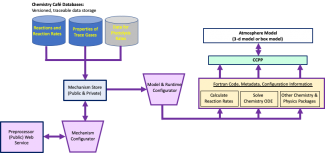The Atmospheric Chemistry Observations and Modeling laboratory at NCAR has been developing the Model Independent Chemistry Module (MICM) to represent chemical transformations in any atmosphere model. To make this happen, MICM is designed to work with the Common Community Physics Package (CCPP) Framework, a software defining how host models access physics parameterizations including chemistry.
MICM gathers information on trace gases and chemical reactions from a database (coined the “Chemistry Café”). It then configures a set of reactions (chemical mechanism) and provides information on how the chemical transformations will be solved with a set of ordinary differential equations as well as how those gases are treated in the host atmosphere model. A data-flow diagram of this process is shown below. This suite of operations creates Fortran code, metadata, and namelist-type information for simulating the chemistry in the atmospheric model. The generated code is compliant with the CCPP Framework allowing MICM code to work with any atmosphere model that is also CCPP compliant.
MICM and its ability to function using the CCPP Framework has been tested with a simple chemistry scheme (5 reactions) in a chemical box model configuration. The box model successfully predicted the trace gas mixing ratios through several diurnal cycles. The MICM-generated Fortran code has also been successfully tested in the Whole Atmosphere Community Climate Model (WACCM) by “piggybacking” MICM trace gases with the WACCM full chemistry scheme (but not using CCPP yet).
Unique aspects of MICM include the use of a web service for the mechanism preprocessor, which allows easy maintenance and development. The Chemistry Café database, which includes trace gas properties along with chemical reactions, provides a single source of information that ensures consistent and traceable values between models and simulations.
MICM will become the core of the NCAR/ACOM chemistry parameterizations implemented in the Multiscale Infrastructure for Chemistry and Aerosols (MUSICA), a global chemistry transport model with regional refinement. MUSICA development is being implemented by the atmospheric chemistry community and is led by NCAR/ACOM scientists and software engineers.
